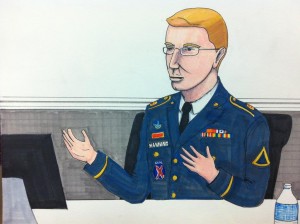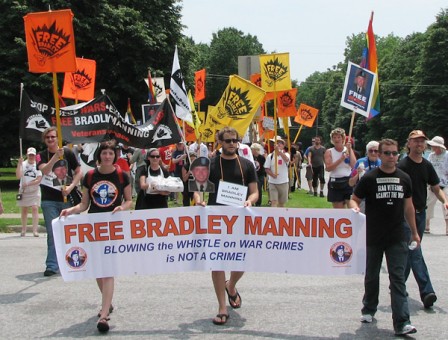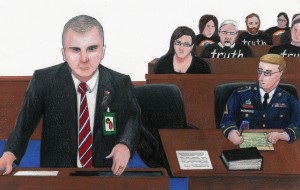Pardon Private Bradley Manning Stand-Out-Central Square, Cambridge, Wednesdays, 5:00 PM -Update –March 1, 2013
Let’s Redouble Our Efforts To Free Private Bradley Manning-President Obama Pardon Bradley Manning -Make Every Town Square In America (And The World) A Bradley Manning Square From Boston To Berkeley to Berlin-Join Us In Central Square, Cambridge, Ma. For A Stand-Out For Bradley- Wednesdays From 5:00-6:00 PM
Since September 2011, in order to publicize Private Manning’s case locally, there have been weekly stand-outs (as well as other more ad hocand sporadic events) in various locations in the Greater Boston area starting in Somerville across from the Davis Square Redline MBTA stop on Friday afternoons and later on Wednesdays. Lately this stand-out has been held each week on Wednesdays from 5:00 to 6:00 PM at Central Square, Cambridge, Ma. (small park at the corner of Massachusetts Avenue and Prospect Street just outside the Redline MBTA stop, renamed Manning Square for the duration of the stand-out) in order to continue to broaden our outreach. Join us there in calling for Private Manning’s freedom.President Obama Pardon Private Manning Now!
***********
The Private Bradley Manning case is headed toward an early summer trial now scheduled for June 2013. The news on his case over the past several months (since about April 2012) has centered on the many pre-trial motion hearings including recent defense motions to dismiss for lack of speedy trial. Private Manning’s pre-trial confinement is now at over 1000 days and will be over well over 1000 days by the time of trial. That motion has now been ruled on by Military Judge Lind and she had denied the defende motion for dismissal, the last serious chance for Bradley Manning to go free before the scheduled June trial. She ruled furthermore that the various delays were inherent in the nature of this case and that the military authorities except in one short instance had been diligent in it efforts to move the proceedings along. For those of us with military experience this is a classic, if perverse, case of that old army slogan-“Hurry up, and wait.” This is definitely tough news for Private Manning although perhaps a good appeal point in some future civilian review.
******
The defense contends that the charges should be dismissed because the military by its own statutes (to speak nothing of that funny old constitutional right to a speedy trial guarantee that our plebeian forbears fought tooth and nail for against the bloody British and later made damn sure was included in the Amendments when the founding fathers“forgot” to include it in the main document) should have arraigned Private Manning within 120 days after his arrest. They hemmed and hawed for almost 600 days before deciding on the charges and a court martial. Nobody in the convening authority, as required by those same statutes, pushed the prosecution forward in a timely manner. In fact the court-martial convening authority, in the person of oneColonel Coffman, seems to have seen his role as mere “yes man” to each of the government’s eight requests for delays without explanation (and without informing the defense in order to take their objection). Apparently the Colonel saw his role as a mere clearing agent for whatever excuse the government gave, mainly endless addition time for clearing various classified documents a process that need not have held up the proceedings. The defense made timely objection to each governmental request to no avail.
Testimony from military authorities at pre-trial hearings in November 2012 about the reasons for the lack of action ranged from the lame to the absurd (mainly negative responses to knowledge about why some additional delays were necessary. One “reason” sticks out as a reason for excusable delay -some officer needed to get his son to a swimming meet and was thus “unavailable” for a couple of days. I didn’t make this up. I don’t have that sense of the absurd. Jesus, a man was rotting in Obama’s jails and they let him rot because of some damn swim meet). The prosecution, obviously, has argued that the government has moved might and main to move the case along and had merely waited until all leaked materials had been determined before proceeding. We shall see.
The defense has also recently pursued a motion for a dismissal of the major charges (espionage/ indirect material aid to terrorists) on the basis of the minimal effect of any leaks on national security issues as against Private Manning’s claim that such knowledge was important to the public square (freedom of information issues important for us as well in order to know about what the hell the government is doing either in front of us, or behind our backs). Last summer witnesses from an alphabet soup list of government agencies (CIA, FBI, NSA, Military Intelligence, etc., etc.) testified that while the information leaked shouldn’t have been leaked that the effect on national security was de minimus. The Secretary of Defense at the time, Leon Panetta, also made a public statement to that effect. The prosecution argued, successfully at the time, that the mere fact of the leak of classified information caused irreparable harm to national security issues and Private Manning’s intent, even if noble, was not at issue.
The recent thrust of the motion to dismiss has centered on the defense’s contention been that Private Manning consciously and carefully screened any material in his possession to avoid any conflict with national security and that most of the released material had been over-classified (received higher security level than necessary).(Much of the materials leaked, as per those parts published widely in the aftermath of the disclosures by the New York Times and other major outlets, concerned reports of atrocities in Iraq and Afghanistan and diplomatic interchanges that reflected poorly on that profession.) The Obama government has argued again that the mere fact of leaking was all that mattered. That motion has also not been fully ruled on and is now the subject of prosecution counter- motions and a cause for further trial delay.
A defense motion for dismissal based on serious allegations of torturous behavior by the military authorities extending far up the chain of command (a three-star Army general, not the normal concern of someone so far up the chain in the matter of discipline for enlisted personal) while Private Manning was first detained in Kuwait and later at the Quantico Marine brig for about a year ending in April 2011 has now been ruled on. In late November and early December Private Manning himself, as well as others including senior military mental health workers, took the stand to detail those abuses over several days. Most important to the defense was the testimony by qualified military mental health professionals citing the constant willful failure of those who held Private Manning in close confinement to listen to, or act, on their recommendations during those periods
Judge Lind, the military judge who has heard all the pre-trial arguments in the case thus far, has essentially ruled unfavorably on that motion to dismiss given the potential life sentence Private Manning faces. As she announced at an early January pre-trial hearing the military acted illegally in some of its actions. While every Bradley Manning supporter should be heartened by the fact that the military judge ruled that he was subject to illegal behavior by the military during his pre-trial confinement her remedy, a 112 days reduction in any future sentence, is a mere slap on the wrist to the military authorities. No dismissal or, alternatively, no appropriate reduction (the asked for ten to one ratio for all his first year or so of illegal close confinement which would take years off any potential sentence) given the seriousness of the illegal behavior as the defense tirelessly argued for. And the result is a heavy-handed deterrent to any future military whistleblowers, who already are under enormous pressures to remain silent as a matter of course while in uniform, and others who seek to put the hard facts of future American military atrocities before the public.
Some other important recent news, this from the November 2012 pre-trail sessions, is the offer by the defense to plead guilty to lesser charges (wrongful, unauthorized use of the Internet, etc.) in order to clear the deck and have the major espionage /aiding the enemy issue (with a possibility of a life sentence) solely before the court-martial judge, Judge Lind (the one who has been hearing the pre-trial motions, not some senior officer, senior NCO lifer-stacked panel. A wise move, a very wise move.). Also there has been increased media attention by mainstream outlets around the case (including the previously knowingly oblivious New York Times), as well as an important statement by three Nobel Peace Laureates (including Bishop Tutu from South Africa) calling on their fellow laureate, United States President Barack Obama, to free Private Manning from his jails.
Check the Bradley Manning Support Network -http://www.bradleymanning.org/ for details and future updates.
*Contribute to the Bradley Manning Defense Fund- as the trial date approaches funds are urgently needed! The government has unlimited financial and personnel resources to prosecute Bradley. And the Obama government is fully using them. We have a fine defense civilian lawyer, David Coombs, many supporters throughout America and the world working hard for Bradley’s freedom, and the truth on our side. Still the hard reality of the American legal system, civilian or military, is that an adequate defense cost serious money. So help out with whatever you can spare. For link go to http://www.bradleymanning.org/ for
*Sign the online petition at the Bradley Manning Support Network (for link go to http://www.bradleymanning.org/ )to the Secretary of the Army to free Bradley Manning-1000 plus days is enough! The Secretary of the Army stands in the direct chain of command up to the President and can release Private Manning from pre-trial confinement and drop the charges against him at his discretion. For basically any reason that he wishes to-let us say 1000 days is enough. Join the over 25,000 supporters in the United States and throughout the world clamoring for Bradley’s well-deserved freedom.
*Call (Comments”202-456-1111, write9 The White House, 1600 Pennsylvana Avenue NW, Washington, DC 20500, e-mail-(http://www.whitehouse.gov’contact/submitquestions-and comments) the White House to demand President Obama pardon Bradley Manning- The presidential powers to pardon is granted under Article II, Section 2 of the Constitution:
“The President…shall have power to grant reprieves and pardons for offenses against the United States, except in case of impeachment .”
In federal cases, and military cases are federal cases, the President of the United States can, under authority granted by the U.S. Constitution as stated above, pardon the guilty and the innocent, the convicted and those awaiting trial- former President Nixon and former Secretary of Defense Caspar Weinberger, for example among others, received such pardons of their heinous crimes- Free Bradley Manning ! Free the whistleblower!
Let’s Redouble Our Efforts To Free Private Bradley Manning-President Obama Pardon Bradley Manning -Make Every Town Square In America (And The World) A Bradley Manning Square From Boston To Berkeley to Berlin-Join Us In Central Square, Cambridge, Ma. For A Stand-Out For Bradley- Wednesdays From 5:00-6:00 PM
***********
Since September 2011, in order to publicize Private Manning’s case locally, there have been weekly stand-outs (as well as other more ad hocand sporadic events) in various locations in the Greater Boston area starting in Somerville across from the Davis Square Redline MBTA stop on Friday afternoons and later on Wednesdays. Lately this stand-out has been held each week on Wednesdays from 5:00 to 6:00 PM at Central Square, Cambridge, Ma. (small park at the corner of Massachusetts Avenue and Prospect Street just outside the Redline MBTA stop, renamed Manning Square for the duration of the stand-out) in order to continue to broaden our outreach. Join us there in calling for Private Manning’s freedom.President Obama Pardon Private Manning Now!
***********
The Private Bradley Manning case is headed toward an early summer trial now scheduled for June 2013. The news on his case over the past several months (since about April 2012) has centered on the many pre-trial motion hearings including recent defense motions to dismiss for lack of speedy trial. Private Manning’s pre-trial confinement is now at over 1000 days and will be over well over 1000 days by the time of trial. That motion has now been ruled on by Military Judge Lind and she had denied the defende motion for dismissal, the last serious chance for Bradley Manning to go free before the scheduled June trial. She ruled furthermore that the various delays were inherent in the nature of this case and that the military authorities except in one short instance had been diligent in it efforts to move the proceedings along. For those of us with military experience this is a classic, if perverse, case of that old army slogan-“Hurry up, and wait.” This is definitely tough news for Private Manning although perhaps a good appeal point in some future civilian review.
******
The defense contends that the charges should be dismissed because the military by its own statutes (to speak nothing of that funny old constitutional right to a speedy trial guarantee that our plebeian forbears fought tooth and nail for against the bloody British and later made damn sure was included in the Amendments when the founding fathers“forgot” to include it in the main document) should have arraigned Private Manning within 120 days after his arrest. They hemmed and hawed for almost 600 days before deciding on the charges and a court martial. Nobody in the convening authority, as required by those same statutes, pushed the prosecution forward in a timely manner. In fact the court-martial convening authority, in the person of oneColonel Coffman, seems to have seen his role as mere “yes man” to each of the government’s eight requests for delays without explanation (and without informing the defense in order to take their objection). Apparently the Colonel saw his role as a mere clearing agent for whatever excuse the government gave, mainly endless addition time for clearing various classified documents a process that need not have held up the proceedings. The defense made timely objection to each governmental request to no avail.
Testimony from military authorities at pre-trial hearings in November 2012 about the reasons for the lack of action ranged from the lame to the absurd (mainly negative responses to knowledge about why some additional delays were necessary. One “reason” sticks out as a reason for excusable delay -some officer needed to get his son to a swimming meet and was thus “unavailable” for a couple of days. I didn’t make this up. I don’t have that sense of the absurd. Jesus, a man was rotting in Obama’s jails and they let him rot because of some damn swim meet). The prosecution, obviously, has argued that the government has moved might and main to move the case along and had merely waited until all leaked materials had been determined before proceeding. We shall see.
The defense has also recently pursued a motion for a dismissal of the major charges (espionage/ indirect material aid to terrorists) on the basis of the minimal effect of any leaks on national security issues as against Private Manning’s claim that such knowledge was important to the public square (freedom of information issues important for us as well in order to know about what the hell the government is doing either in front of us, or behind our backs). Last summer witnesses from an alphabet soup list of government agencies (CIA, FBI, NSA, Military Intelligence, etc., etc.) testified that while the information leaked shouldn’t have been leaked that the effect on national security was de minimus. The Secretary of Defense at the time, Leon Panetta, also made a public statement to that effect. The prosecution argued, successfully at the time, that the mere fact of the leak of classified information caused irreparable harm to national security issues and Private Manning’s intent, even if noble, was not at issue.
The recent thrust of the motion to dismiss has centered on the defense’s contention been that Private Manning consciously and carefully screened any material in his possession to avoid any conflict with national security and that most of the released material had been over-classified (received higher security level than necessary).(Much of the materials leaked, as per those parts published widely in the aftermath of the disclosures by the New York Times and other major outlets, concerned reports of atrocities in Iraq and Afghanistan and diplomatic interchanges that reflected poorly on that profession.) The Obama government has argued again that the mere fact of leaking was all that mattered. That motion has also not been fully ruled on and is now the subject of prosecution counter- motions and a cause for further trial delay.
A defense motion for dismissal based on serious allegations of torturous behavior by the military authorities extending far up the chain of command (a three-star Army general, not the normal concern of someone so far up the chain in the matter of discipline for enlisted personal) while Private Manning was first detained in Kuwait and later at the Quantico Marine brig for about a year ending in April 2011 has now been ruled on. In late November and early December Private Manning himself, as well as others including senior military mental health workers, took the stand to detail those abuses over several days. Most important to the defense was the testimony by qualified military mental health professionals citing the constant willful failure of those who held Private Manning in close confinement to listen to, or act, on their recommendations during those periods
Judge Lind, the military judge who has heard all the pre-trial arguments in the case thus far, has essentially ruled unfavorably on that motion to dismiss given the potential life sentence Private Manning faces. As she announced at an early January pre-trial hearing the military acted illegally in some of its actions. While every Bradley Manning supporter should be heartened by the fact that the military judge ruled that he was subject to illegal behavior by the military during his pre-trial confinement her remedy, a 112 days reduction in any future sentence, is a mere slap on the wrist to the military authorities. No dismissal or, alternatively, no appropriate reduction (the asked for ten to one ratio for all his first year or so of illegal close confinement which would take years off any potential sentence) given the seriousness of the illegal behavior as the defense tirelessly argued for. And the result is a heavy-handed deterrent to any future military whistleblowers, who already are under enormous pressures to remain silent as a matter of course while in uniform, and others who seek to put the hard facts of future American military atrocities before the public.
Some other important recent news, this from the November 2012 pre-trail sessions, is the offer by the defense to plead guilty to lesser charges (wrongful, unauthorized use of the Internet, etc.) in order to clear the deck and have the major espionage /aiding the enemy issue (with a possibility of a life sentence) solely before the court-martial judge, Judge Lind (the one who has been hearing the pre-trial motions, not some senior officer, senior NCO lifer-stacked panel. A wise move, a very wise move.). Also there has been increased media attention by mainstream outlets around the case (including the previously knowingly oblivious New York Times), as well as an important statement by three Nobel Peace Laureates (including Bishop Tutu from South Africa) calling on their fellow laureate, United States President Barack Obama, to free Private Manning from his jails.
************
Check the Bradley Manning Support Network -http://www.bradleymanning.org/ for details and future updates.
*Contribute to the Bradley Manning Defense Fund- as the trial date approaches funds are urgently needed! The government has unlimited financial and personnel resources to prosecute Bradley. And the Obama government is fully using them. We have a fine defense civilian lawyer, David Coombs, many supporters throughout America and the world working hard for Bradley’s freedom, and the truth on our side. Still the hard reality of the American legal system, civilian or military, is that an adequate defense cost serious money. So help out with whatever you can spare. For link go to http://www.bradleymanning.org/ for
*Sign the online petition at the Bradley Manning Support Network (for link go to http://www.bradleymanning.org/ )to the Secretary of the Army to free Bradley Manning-1000 plus days is enough! The Secretary of the Army stands in the direct chain of command up to the President and can release Private Manning from pre-trial confinement and drop the charges against him at his discretion. For basically any reason that he wishes to-let us say 1000 days is enough. Join the over 25,000 supporters in the United States and throughout the world clamoring for Bradley’s well-deserved freedom.
*Call (Comments”202-456-1111, write9 The White House, 1600 Pennsylvana Avenue NW, Washington, DC 20500, e-mail-(http://www.whitehouse.gov’contact/submitquestions-and comments) the White House to demand President Obama pardon Bradley Manning- The presidential powers to pardon is granted under Article II, Section 2 of the Constitution:
“The President…shall have power to grant reprieves and pardons for offenses against the United States, except in case of impeachment .”
In federal cases, and military cases are federal cases, the President of the United States can, under authority granted by the U.S. Constitution as stated above, pardon the guilty and the innocent, the convicted and those awaiting trial- former President Nixon and former Secretary of Defense Caspar Weinberger, for example among others, received such pardons of their heinous crimes- Free Bradley Manning ! Free the whistleblower!











5 thoughts on “Rally for Bradley Manning. Join us at Fort Meade on June 1, 2013.”